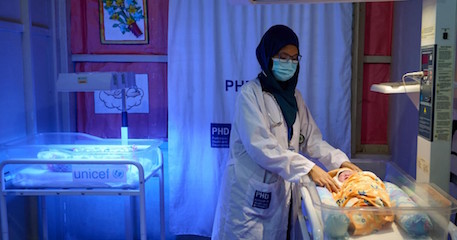The numbers are staggering — both in their size and senselessness.
Each year, according to data from the Global Burden of Disease Study, nearly 1 million children and adolescents under age 20 die from often treatable noncommunicable diseases (NCDs). These deaths account for 15 percent of overall mortality for this age group. NCDs are also the source of nearly 25 percent of all child and adolescent disabilities worldwide.
Despite their treatability and preventability, NCDs — including chronic respiratory disease, cancer, high blood pressure, heart disease, asthma, obesity and diabetes — are on the rise in low- and middle-income countries, where a lack of access to basic, quality health care is both an acute risk and a chronic challenge.
NCDs are on the rise in low- and middle-income countries
NCDs are quiet, steady stalkers that plant their roots early, shadowing children from their early years into adulthood, crippling their social development, stunting their potential and needlessly cutting short their lives.
Globally, NCDs are estimated to cause cumulative global losses of $47 trillion by 2030, according to the NCD Alliance, worsening economic inequality and trapping a new generation in the debilitating cycle of poverty.
Nurse/midwife Enipher Majawa examines a patient’s health information at UNICEF-supported Nsanje District Hospital in Nsanje, Malawi. © UNICEF/UN0381846/Chikond
It does not have to be this way. UNICEF is working relentlessly to reverse this troubling trend and save children’s lives, defend their rights and empower them to fulfill their potential by expanding its focus to include the fight against NCDs. This work is reflected in UNICEF’s Strategic Plan 2022-2025. which reflects UNICEF’s committment to promote the rights of every child.
UNICEF Is working on the ground with governments, local health care workers and educators to help vulnerable children in some of the world’s most challenging and least accessible places to stop the preventable from becoming inevitable, and develop sustainable, scalable health care infrastructures and systems that save lives and deliver lasting change.
Exposure to NCD risk factors may begin even before a child is born
Activities are now underway in Bangladesh, Malawi, Nepal, the Philippines and Zimbabwe to improve health outcomes for 10 million children and adolescents living with NCDs by strengthening country-level health systems and models that provide care and support for children and adolescents with chronic conditions.
In Malawi, for example, UNICEF is launching training programs with in-country health care workers and hospitals to help them better detect, screen, control, treat and support children suffering from NCDs. Because exposure to NCD risk factors may begin before or during pregnancy, UNICEF is integrating NCD prevention into maternal, newborn and child health programs.
UNICEF is also teaming up with teachers and school administrators to create comprehensive classroom materials to spread information about the dangers of NCDs and educate children and adolescents on how they can change the behaviors and habits that lead to NCDs and exacerbate their impact, like tobacco and alcohol use, unhealthy diet and physical inactivity.
Mita Rani Barman, a community mobilizer with UNICEF partner CODEC in Bangladesh, conducts a group session to discuss how pregnant and lactating women should care for themselves and their newborn babies as part of UNICEF’s Communication for Development (C4D) project. © UNICEF/UN0464821/Himu
UNICEF has embarked on a pioneering collaboration with Eli Lilly and Company to support vulnerable communities and help move us closer to achieving United Nations Sustainable Development Goal 3: Ensure healthy lives and promote well-being for all at all ages.
Eli Lilly has committed $14.4 million to support UNICEF’s global campaign to address immediate and long-term NCD risks, strengthen health systems and enhance the ability of heatlh care workers and educators for children facing the greatest need.
This initial four-year effort is part of UNICEF’s ten-year plan to reach 40 countries with health system interventions that could radically reshape the global NCD landscape to ensure every child has access to lifesaving treatments and no child suffers a premature, preventable death.
UNICEF is working to reshape the global NCD landscape
These efforts will focus on building awareness in each country on the importance of treating childhood NCDs within national, regional and global health and multisectoral frameworks, and on the need to address key environmental and behavioral NCD factors that manifest in childhood to avert the potential development of NCDs later in life.
UNICEF is committed to investing in communities in fragile settings and equipping frontline ambassadors with the tools, technology, training and knowledge they need to improve the qualiity, efficiency and accessibility of local health systems to create long-term, scalable, sustainable change.
Top photo: A newborn baby undergoes photo therapy at a UNICEF primary health care center in a Rohingya refugee camp in Bangladesh. UNICEF, with support from Eli Lilly, is training health care workers here to integrate NCD prevention into their maternal, newborn and child health programs. © UNICEF/UN0581077/Sujan
